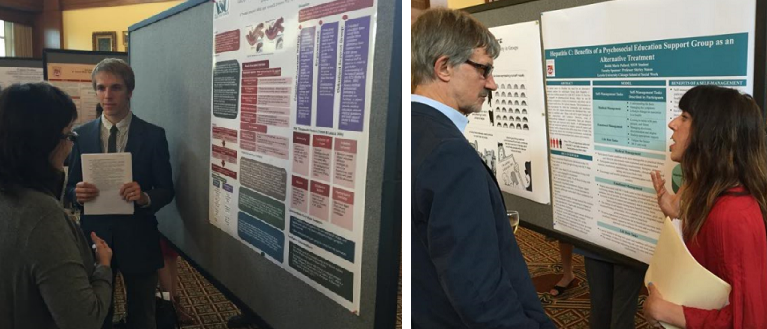2020 Poster Presentation GalleryMatthieu Hammond-Rivard, Université du Québec à Montréal, Montréal, QC (Canada) Cette présentation a pour but d’illustrer comment actualiser les spécificités des travailleurs sociaux en intervention de groupe, à contrecourant de la technocratie, l’individualisme et la responsabilisation individuelle. Elle dépeint les différentes étapes par lesquelles un groupe cognitivo-comportemental pour hommes portant sur la colère, a pu être transformé en un groupe d’aide mutuelle. Elle met en lumière l’importance de la prise en compte des conditions structurelles et sociales qui contribuent à maintenir ces hommes en difficulté. Improving the Health of the Bisexual Community through the Creation of a Citywide Task Force A. Kai Korpak, Loyola University Chicago, Chicago, IL (USA) In 2018, with leadership from bisexual community stakeholders, LGBT community organizations, healthcare systems, and researchers, a task force was created to identify and address the health inequities facing bisexual communities in Chicago. This poster will describe the ways in which the task force is working to improve the health of bisexual communities through community-engaged policy and advocacy. Recommendations for supporting bisexual communities will be provided. Migrants in Transit: A Proposed Model for Group Work Intervention Daniela Barrios Morello, Loyola University Chicago, Chicago, IL (USA) This poster describes the process of developing meaningful group work interventions targeting migrants in transit. Grounded in a transnational partnership between a midwestern university and a shelter in Mexico, it is hoped that this project will promote the development of group work interventions that may be adapted to the needs of migrants, asylum seekers, and refugees as a way to help counteract their multiple stressors and support their socioemotional wellbeing. Boost Cognition, Reduce Delinquency: Movement Based Groups for Adolescent Boys Samantha Cossen, Loyola University Chicago, Chicago, IL (USA) This poster will focus on the outcomes of a small-group for at-risk, adolescent boys at a midwest suburban high school focused on cognition and physical exercise. The poster explores the positive impact of physical exercise on the human brain, provides examples of social emotional activities and groups to increase cognition, and discusses an example of a movement-based social emotional small group for adolescent boys. Sarah Kelly, Loyola University Chicago, Chicago, IL (USA) This poster describes how developmental trauma may impact a person’s ability to participate in group. Additionally, it provides interventions to implement with clients to prepare for group participation. It describes how to determine if a client’s sensory integration, self-regulation, and relational skills are developed so that they can participate in a group and not be contraindicated. Veronika Kudina, Loyola University Chicago, Chicago, IL (USA) The 2020 miles in 2020 challenge is based on philosophy that was established by authors of Run The Edge. They created an exclusive Facebook group to encourage individuals to form social bonds and do their best to complete 2020 miles in 2020. This poster will showcase how the virtual exercise Facebook group was developed and the impact on members as they post their personal stories, interact with one another, and motivate each other to succeed. Reinforcing Effective Diabetes Group Education in an Outpatient Setting Kaaren Royster, Alabama A&M University, Huntsville, AL (USA)Meredith Lewis, UAB Huntsville Family Medicine Residency, Huntsville, AL (USA)
Diabetes is a major health issue. In the U.S. alone, there are 30 million patients affected with diabetes. This poster will highlight the impact of offering diabetes education groups to patients and how they were pivotal for motivating patients and offering accountability. Fostering Cross-Generational Support through Narrative Group Interventions with LGBTQ Populations Kelsey Tevik, Loyola University Chicago, Chicago, IL (USA) The rapidly changing social landscape of the past 50 years has led to a distinctive social divide between adults and youth within the LGBTQ community. This poster examines potential benefits of utilizing group narrative therapy interventions for fostering cross-generational connection and support among LGBTQ populations. It discusses current literature, as well as identifying need for future research and scholarship. A curriculum for a ten-week LGBTQ narrative therapy group is provided. Rasa Naujaniene, Vytautas Magnus University, Kaunas (Lithuania) This poster explains the current practice of child welfare system in the context of Lithuania. Based on statistical analysis generated results from a recent study, the poster will discuss how child neglect and violence against a child is conceptualized, what nature of intervention is dominant, and possibilities for the development of psychosocial services. Developing Critical Competencies: Social Skills Groups in Schools Jessica Lee, Loyola University Chicago, Chicago, IL (USA) This poster aims to illustrate the need for social skill groups in school settings, examine group interventions targeting social skill development with young men of color, and highlight key components and challenges of group interventions. Ideas for future group-based interventions will also be discussed. About 2020 Posters PresentationsVirtual Poster Gallery and Poster Presentation Live SessionsWe recognize that posters are a unique challenge to shift virtually, so we welcome your input and creativity in facilitating poster sessions. Below are two suggested options for poster presentations. Presenters are welcome to participate in one or both formats. We encourage you to consider and develop additional approaches and share them with us at [email protected].
Recommended Poster Presentation GuidelinesPoster Format:
|

